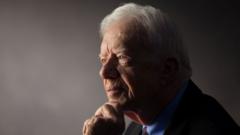As the world mourns the passing of Jimmy Carter, comparisons arise between his presidency and that of Joe Biden amid similar crises of confidence, economic woes, and foreign policy dilemmas.
Jimmy Carter vs. Joe Biden: Parallels in Presidential Challenges

Jimmy Carter vs. Joe Biden: Parallels in Presidential Challenges
A retrospective on the striking similarities between the challenges faced by Jimmy Carter and the current presidency of Joe Biden.
The life and presidency of Jimmy Carter, who passed away recently, are echoed in the challenges faced by current President Joe Biden. Over forty years separated Carter's exit from the Oval Office and his eventual passing, yet many of the pressing issues of 2024 resonate strongly with those of the late 1970s. Both administrations faced substantial economic hardships and foreign policy dilemmas that instilled a profound sense of uncertainty within the American public.
During Carter's presidency, the nation grappled with an economic crisis characterized by rising inflation and an energy shortage, reminiscent of today's economic challenges marked by soaring prices exacerbated by the pandemic and ongoing global conflicts. The resounding lessons of Carter's presidency linger, as the U.S. strives for stable economic growth amid external pressures.
Both Carter and Biden found their leadership marred by significant geopolitical crises. Carter's diplomatic success in brokering the Camp David accords was overshadowed by the devastating Iranian hostage situation—a comparable reality for Biden unfolded during the chaotic U.S. withdrawal from Afghanistan, showcasing the struggle of U.S. influence amid complex global dynamics.
Carter’s administration faced heavy criticism for its handling of the Soviet Union's invasion of Afghanistan, leading to the U.S. Olympic boycott, a decision that seemed inadequate in the face of such overwhelming aggression. In contrast, Biden's early approach to the Russian invasion of Ukraine garnered notable support, but as the conflict extended, public confidence in his leadership faced scrutiny, much like Carter’s weakened standing following the Iranian crisis.
Both leaders emerged during eras marked by declining trust in government. Reflecting on his presidency, Carter likened the public sentiment to a "crisis of confidence," a phrase that has resurfaced repeatedly in discussions surrounding Biden's tenure. Trust in government continues to wane, influenced by a torrent of partisan discord and scarring events diminishing faith in U.S. institutions.
Carter's legacy extends beyond his presidency, characterized by humanitarian efforts and a commitment to public service through organizations like Habitat for Humanity. Biden's ambitions of restoring faith in public governance and collaborative diplomacy confront setbacks in an increasingly polarized political landscape, drawing parallels to the challenges faced by Carter after his term.
Ultimately, while four decades have passed since Carter's presidency, the similar trials of leadership continue to resurface, portraying a complex American political landscape that intertwines past and present. As the nation grapples with looming crises, the examination of Carter's legacy alongside Biden's presidency becomes an ongoing narrative reflecting a unique intersection of history and governance.






















